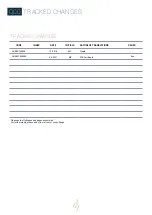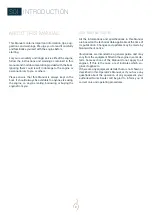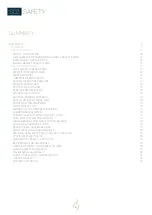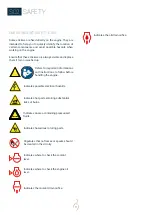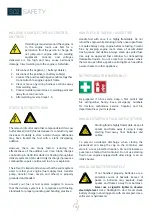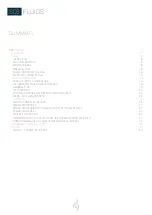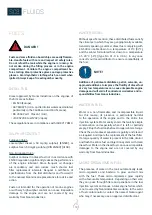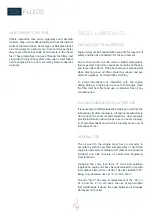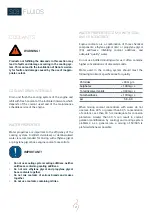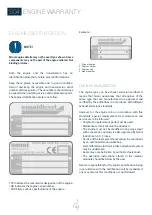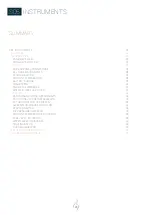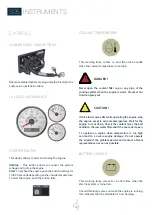
15
WELDING NEAR ELECTRONIC CONTROL
UNIT (ECU)
If welding is required around the engine, or
in the engine room, ask first for a
permission from the person in charge. Do
not jump-start engine with arc welding
equipment. Currents and voltages
delivered are too high and may cause permanent
damage. Direct welding onto the engine is forbidden.
1. Disconnect the negative (-) battery cable(s).
2. Disconnect the positive (+) battery cable(s).
3. Connect the positive and negative cables together.
Do not attach to engine support frame.
4. Clear or move any wiring harness sections away
from welding area.
5. Connect welder ground close to welding point and
away from control units.
6. After welding, reverse Steps 1-5.
STATIC ELECTRICITY RISK
The removal of sulfur and other compounds in Ultra-Low
Sulfur Diesel (ULSD) fuel decreases its conductivity and
increases its ability to store a static charge. Refineries
may have treated the fuel with a static dissipating
additive.
However, there are many factors reducing the
effectiveness of the additive over time. Static charges
can build up in ULSD fuel while it is flowing through fuel
delivery systems. Static electricity discharge in presence
combustible vapors could result in a fire or explosion.
Therefore, it is important to ensure that the entire system
used to refuel your engine (fuel supply tank, transfer
pump, transfer hose, nozzle, and others) is properly
grounded and bonded.
Consult your fuel or fuel system supplier to ensure
that the delivery system is in compliance with fueling
standards for proper grounding and bonding practices.
HANDLE FUEL SAFELY - AVOID FIRE
Handle fuel with care: it is highly flammable. Do not
refuel the engine while smoking or when near open flame
or sparks.Always stop engine before refueling. Prevent
fires by keeping engine room clean of accumulated
trash, grease, and debris. Always clean up spilled fuel.
Use only an approved fuel container for transporting
flammable liquids. Do not store fuel container where
there is an open flame, spark, or pilot light such as within
a water heater or other appliance.
BE PREPARED FOR EMERGENCY
Be prepared if a fire starts. Keep a first aid kit and
fire extinguisher handy. Keep emergency numbers
for doctors, ambulance service, hospital, and fire
department near your telephone.
HANDLE STARTING FLUID SAFELY (ETHER)
Starting fluid is highly flammable. Keep all
sparks and flame away if using it. Keep
starting fluid away from batteries and
cables.
To prevent accidental discharge when storing the
pressurized can, keep the cap on the container, and
store in a cool, protected location. Do not incinerate or
puncture a starting fluid container. Do not use starting
fluid on an engine equipped with glow plugs or an air
intake heater.
HANDLING BATTERIES SAFELY
If not handled properly, batteries are a
potential source of hazards. Excess of
gases in batteries may explode. Keep
sparks and flames away from batteries.
Never use a cigarette lighter to observe
electrolyte level
. Use a flashlight to do it. Never check
battery charge in shorting posts with a metal part. Use a
voltmeter or hydrometer.
S02
SAFETY
Summary of Contents for Z4.205
Page 2: ......
Page 4: ......
Page 39: ...39 S06 COMPONENTS ENGINE VIEWS T4 205 T4 230 T4 270...
Page 40: ...40 S06 COMPONENTS ENGINE VIEWS Z4 205 Z4 230 Z4 270...
Page 97: ......



